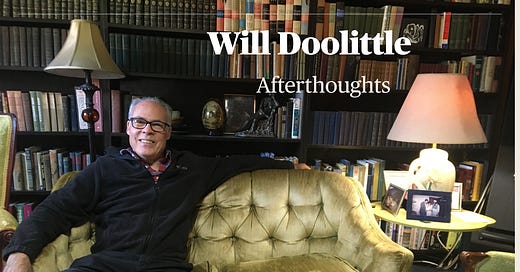By Will Doolittle
When I climb the stairs, I switch the cane to my left hand, so I can grip the banister with my right. The pain in my legs has eased, but it hasn’t disappeared.
I strained my lower back about a month ago. I’ve done it before, but this time, as my back loosened up, my legs began to ache. Then electric pain shot through my legs, so unbearable I had to go to the ER.
X-rays didn’t show anything, I was prescribed a steroid and an anti-inflammatory, and after five hours of sitting in a hard, uncomfortable wheelchair, I came home. Now, two and a half weeks later, I’m waiting for the insurance company to approve physical therapy.
But this column isn’t about the agonies our health care industry inflicts; it’s about the effects of the pain itself.
Luckily for me, this injury hurts only when I walk. So as I’m lurching through the dining room, bent over and occasionally yelping, I at least can find relief when I reach the kitchen and sit down.
I’m lucky, too, that the pain is temporary. Before long, I’ll be sleeping flat on my back again instead of propped up on pillows, and I’ll be striding around the neighborhood again, walking the dog.
Slowly, the pain is fading, and I believe, with enough rest and enough ice and some stretching, it will disappear.
But the changes the pain is imposing on my daily activities have made me think again about the burdens people carry, which are often hidden; the injuries we all suffer over time to body and spirit.
My wife, Bella, and I drive around to garage sales on weekends in the summer. We both have things we like to buy, and it’s a fun way to tour the local neighborhoods and chat with folks. Our dog, Ringo, loves jumping in and out of the car and exploring new driveways.
Frequently during these excursions, people recognize me from my many years of writing columns for The Post-Star, and any regular reader knows I can fairly be described as a liberal. Since this region is largely conservative, many of the people we meet must have political views different from mine, but no one ever greets us with anything but warmth and welcome.
This politeness is expected, not extraordinary. This is the way good people behave.
It is a debate right now whether, because of our cultural polarization and the undermining of our institutions and the widespread and pernicious disinformation that is making it easy for people who want to embrace lies to do so, our country is headed for some sort of political disintegration.
I don’t know where we’re headed, but I fear the possibilities, and the more contact I have with the world of political argument on cable news or social media, the more fearful (and angry) I get.
The antidote is getting out and about and seeing other human beings who are walking their dogs and raking their lawns, working on improving the quality of their lives in small, quiet ways.
Our country has suffered an injury that is still afflicting us. We are limping around, feeling the shocks of political violence, of insults and lies and corruption. As we approach another election, we can heal only through demanding in our politics the common decency we take for granted everywhere else.
It’s not enough to be polite and truthful and fair — and generous — at garage sales. We must insist on the same behavior from people we elect to represent us. If we don’t, we won’t be able to keep these worlds separate — the cruelty and chaos we allow in our politics will seep into the rest of our lives. Eventually, it will overwhelm us.
Will Doolittle wrote a column for The Post-Star for nearly three decades before retiring in 2021.
Readings
I’m reading James Boswell’s “London Journal 1762-1763,” a record by Boswell of his time in London at the age of 22. In it, Boswell, who was Scottish, recounts his amorous adventures, his enjoyment of eating beef and his persistent and futile efforts to get a military commission and enter what he calls “the guards.”
Boswell had passed an oral law exam in Edinburgh, but he doesn’t practice law while in London or even talk about it. He lives off a modest allowance from his father, a judge, and seems to spend all of his time gadding about. He’s a wonderful, fun and frank writer, combining a youthful heedlessness of the way he exposes his own shortcomings and a sensitivity to the feelings and reactions of his acquaintances. His genius for retelling amusing and revealing scenes and his gift for dialogue, which would become famous later, is already present here.
He meets Samuel Johnson for the first time during this year in London, but his masterwork, “Life of Johnson,” isn’t published until 1791, four years before his death at age 54. His health was, apparently, compromised by years of intermittent drinking and numerous (Wikipedia says 17) bouts of venereal disease. He left behind a huge trove of journals and letters, much of which lay hidden in a castle in Ireland until the 20th century. The “London Journal” was among the discoveries, and the edition I’m reading wasn’t published until 1950.







Tom Philo
just now
Spot on, Will! ~ Too many merchants of hate!
Side note... I was at a seminar for a volunteer organization... There was a woman speaking about dementia and in her slide presentation, there was a picture of Will and Bella.
For the people who know the couple, it was a nice way to put a human touch on the issue and Bella's smile in the picture, put a smile on my face.